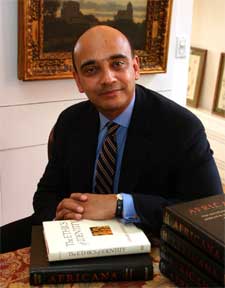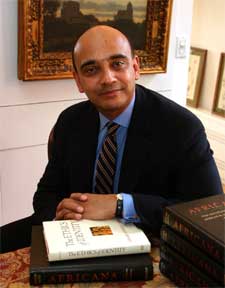 KINGSTON, R.I. –September 19, 2007—Members of the public as well as students enrolled in a sociology class taught by Professor Calvin B. Peters will be treated to the thoughts and considerations of a widely-respected philosopher and author next month.
KINGSTON, R.I. –September 19, 2007—Members of the public as well as students enrolled in a sociology class taught by Professor Calvin B. Peters will be treated to the thoughts and considerations of a widely-respected philosopher and author next month.
Kwane Anthony Appiah, the Laurance S. Rockefeller University Professor of Philosophy and the University Center for Human Values at Princeton University, will visit the University of Rhode Island for two days next month. His visit includes a public presentation Oct. 18 at 5 p.m. in Edwards Auditorium, 64 Upper College Road., Kingston. The talk is free and open to the public.
Appiah’s latest book, Cosmopolitanism: Ethics in a World of Strangers–winner of the 2007 Arthur Ross Award of the Council on Foreign Relations– is required reading for Peters’ course this fall. Appiah will speak to the SOC 100 class on Oct. 19.
“I chose this book because it addresses important issues for our times,” says Peters. “The course is oriented around three questions: how we narrate our own lives, how we narrate the lives of others, and how we narrate our life together. Appiah’s book helps us think about the second two questions in particular.
“What I hope students get from reading this is an appreciation of difference – that we aren’t all the same “deep down” – and a sense of how different a “life worth living” looks depending on one’s circumstances,” said the sociology professor. “At the same time, I also hope they are willing to engage with difference, rather than merely “celebrate” it or tolerate it in the weak sense that others can do “whatever” (they want to do).”
Appiah, a respected educator and philosopher–he has taught at Yale, Cornell, Duke, Harvard, in France, Germany, Ghana, and South Africa—has authored many books, including publishing widely in African and African-American literary and cultural studies. His major current work has to do with 1) the philosophical foundations of liberalism and 2) with questions of method in arriving at knowledge about values.
In Cosmopolitanism, Appiah tackles some of the central ethical questions of our time. How is it possible to consider the world a moral community when there is so much disagreement about the nature of morality? How can you take responsibility for every other life on the planet and still live your own life? His answers and solutions—grounded in a new ethics of cosmopolitanism, celebrates our common humanity, while at the same time offering a practical way to manage our differences. He helps readers develop a new approach to living a moral life in the modern age—where the competing claims of “a clash of civilizations” and a groundless moral relativism makes such a project seem impossible.
Sponsors for Appiah’s visit include Friends of Sociology 100, the URI John Hazen White Sr. Center for Ethics and Public Service; the URI Center for the Humanities; the URI College of Arts and Sciences; the Office of the Provost; the College of Human Science and Services; and the URI Visiting Scholars Committee.

